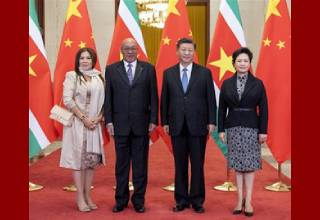Homepage > SERVICE > Economic Gains of Gender Equality Highlighted
Economic Gains of Gender Equality Highlighted
Time: 2020/12/16 11:15
Author:Supporting gender equality will benefit individuals as well as advance the growth of enterprises and the world economy, said international organizations and delegates at a conference on gender equality that opened in Beijing on Tuesday.
When companies and industries have gender diversity, net profits are likely to increase globally, said Smriti Aryal, head of the office of United Nations Women in China, at the International Conference on Gender Equality and Corporate Social Responsibility.
The conference noted progress made and actions required to overcome gender barriers in the private sector. It was organized by the China branch of UN Women — also known as the United Nations Entity for Gender Equality and the Empowerment of Women — in partnership with the Delegation of the European Union to China and the Embassy of Sweden.
Helena Sangeland, Sweden's ambassador to China, said in her speech that her country's guiding principle for gender equality is that everyone has the right to work and support themselves, to balance career and family life, and to live without the fear of abuse or violence.
"There is a great untapped potential to harness corporate resources for gender equality and social sustainability in general," she added.
Studies have shown that gender equality enhances both economic growth and good business.
For example, 2016 research conducted by the McKinsey Global Institute found that the Asia and Pacific region could add $4.5 trillion to total annual GDP by 2025 by advancing gender equality, a 12 percent increase on current forecasts. China could reap the largest increase in a single country at $2.6 trillion, a 13 percent increase over business-as-usual GDP.
A 2014 report from Gallup indicated that the revenues of business units with gender diversity in the retail industry were 14 percent higher on average than for those companies lacking such diversity. It also found that hospitality companies with diversity had a 19 percent greater average quarterly net profit than less-diverse business units.
However, Asia and the Pacific is the only region where women's labor force participation is on a downward trend, sliding from 56 percent in 1990 to 49 percent in 2013, according to Sally Barber, a project coordinator at UN Women.
The World Economic Forum estimates that the economic opportunity gender gap will take 202 years to close completely.
Program Launched
A regional program called We Empower Asia, launched at the conference, aims to increase the number of women who lead, participate in and have access to business opportunities and leadership within the private sector. It will work in seven countries: China, India, Indonesia, Malaysia, the Philippines, Thailand and Vietnam.
Du Ying, delivery director of ThoughtWorks' China East Market Unit, said her Chicago-based software company has witnessed an increase in its economic benefit by involving more women in the workplace.
At ThoughtWorks, 40 percent of those employed in software development and consulting work are women, a rare percentage in the industry, Du said.
"The diversity of the team will inevitably bring the diversity of views, so we will be able to design products that can meet the needs of more groups of customers," she said.
Lu Haina, associate professor at Renmin University of China, said one of the disadvantages for women in the workplace is the lack of social resources and mentors, which restricts their development and promotion opportunities.
She suggested establishing a women-led network to help develop women's social resources as well as improve their leadership qualities.
(Source: China Daily)
- Ministry Takes Aim at Sexual (Dec 16)
- Former Members of Chinese Wom (Dec 16)
- China, Suriname Establish Str (Dec 16)
- Xi Offers Congratulations on (Dec 16)
| Media partners: |
| US 103 radio broadcast Ra | U.S. regulation news | |



